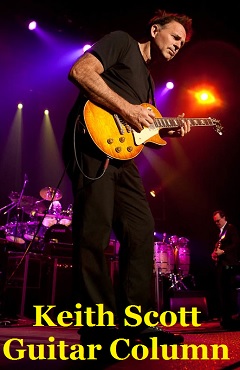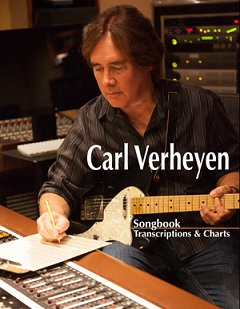Nile Rodgers
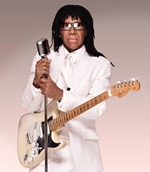
Nile Rodgers is well known for delivering numerous hit songs as the songwriter and guitar player of CHIC. Since the 80s Nile Rodgers has also made his name known as a producer for countless big artists such as Madonna, David Bowie, Diana Ross, Duran Duran, just to name a few. He has also fascinated and influenced many guitar players around the world with his dynamic and groove oriented rhythm guitar performances.
Nile Rodgers collaborated with DAFT PUNK on their latest release “Random Access Memories” proving that he still keeps fascinating the world with his amazing music and guitar performances. MUSE ON MUSE interviewed Nile Rodgers during his stay in Japan with the CHIC tour. Nile talked to us about several topics including CHIC, producing, as well as some aspects of playing the guitar.
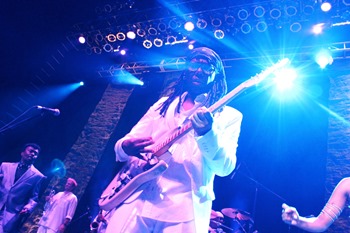
Interview / Text Mamoru Moriyama
Translation Louis Sesto (EAGLETAIL MUSIC)
Muse On Muse : You are currently on tour with ‘CHIC featuring NILE RODGERS’. How has the response been around the world?
Nile Rodgers : Amazing! This has been our biggest year ever. We’ve been doing this for a long time, and we now have a larger audience than what we’ve ever had since we started. We have the people who like all the music that they consider classics, the older crowd, and we have a bunch of young kids who have been turned on to our music through films like ‘Shrek’ and all these popular films. I didn’t even realize this, because they would show up to the concerts and they would sing “We Are Family” and “Good Times”, “Le Freak”… and I’d wonder how they learned it. They’d laugh at me and say, “Are you crazy? It’s in ‘Toy Story’! We love it!” And I never thought about that. So the tour has been spectacular. We’ve played in front of more than 2 million people this year.
MM : How have the shows been in Japan?
NR : The shows in Japan at the Blue Note are like perfect. We’ve been playing there for so long that we have a built-in fan base. A lot of people are repeat customers, but this year I’ve been asking people who are coming to a CHIC show for the first time, and I’d say it’s been about 20 to 30 percent of the audience, which is pretty unique. Almost everybody that we see at the Blue Note we see over and over again. So it just shows that it’s getting bigger and bigger.
MM : After releasing “Chic Organization : Up All Night” you also have a “Disco Edition” out now. Tell us about this album.
NR : Our concept was that we wanted to become the GRATFUL DEAD of dance music. In most dance festivals there are no live bands. They’re all DJs. We’re the one band that plays everywhere and we have the biggest crowds. The first version of the album was all purely recorded. But I wanted to see how people responded to our live music, to just see if they would actually buy that and want to hear that again. Because I see a lot of hits on YouTube, but I wanted to see if people would say “I want to hear THIS version of “Let’s Dance””. MADONNA gave me my 12 inch that I did with her of “Like A Virgin”. So I just wanted to see if in today’s world, would people be interested in different versions and different packages of music just because they like the song? Some people may say “I want to hear that version they played at Glastonbury!” Like GRATFUL DEAD you would hear all these versions. It’s an experiment on my part. It’s not an ego. I don’t really care, but I just want to see if a person would say “I liked the way you played “Le Freak” last night better than the way you played the other night”. The response has been huge too.
MM : The album features many hit songs that you have created with Bernard Edwards, such as CHIC and SISTER SLEDGE. Can you share with us some of the memories you have in the making of these hit songs?
NR : It’s funny that we called the album “Up All Night”, because the truth is we used to make those records at night. We didn’t have a lot of money, so they were always done very cheaply and quickly. There was a whole concept of putting the record out. Those were all records that were done in less than a week. The very first CHIC album we did in 3 days. SISTER SLEDGE was about the same, done in a week. MADONNA, just a little bit more than a few weeks. DAVID BOWIE “Let’s Dance”, that whole album was done in 17 days, start to finish. So that’s what we’re doing, this whole album package is paying homage to a certain style and certain mentality of record making that has gone away until I wound up doing “Get Lucky” with DAFT PUNK. We approached it in the same way. I did all 3 songs with DAFT PUNK in 1 day. Just the same way we used to make records in the old days.
MM : You have taken part on DAFT PUNK’s latest album ”Random Access Memories”, on songs such as “Lose Yourself To Dance”, “Give Life Back To Music ” and “Get Lucky ” and the collaboration seems to be being received well. Can you tell us how you ended up collaborating with DAFT PUNK?
NR : I’ve known them for 17 years. We met at a listening party. Every artist I’ve ever worked with, I always meet at a party or a bar, or something like that. The record companies don’t put us together. We put ourselves together. There have been only 2 or 3 artists that have been put together by the record company. I met DAVID BOWIE at a bar. I met MADONNA at a disco. I met DURAN DURAN at a concert. I met INXS opening up for U2. I met HALL AND OATES at a show…I mean, everybody! All the new records I have coming out…I have maybe 10 records coming out. I met AVICII backstage at Radio City Music Hall. I met TENSNAKE and we went out for dinner. CARL COX, I was leaving my hotel and he was coming in. DAVID GUETTA, same thing, and we just greeted each other. Everything is like that and that’s probably why I make so many records with so many different people.
MM : How was it working with DAFT PUNK?
NR : Same as working with CHIC, easy! We just say what we’re going to do and we do it. It’s really that easy. Whenever I toil over records and work hard, it never is a hit. That doesn’t mean that the record doesn’t sound good or cool. But the records that are the big hits you could almost be assured that I made those records in a few hours. As I said, all 3 DAFT PUNK songs I did in 1 day.
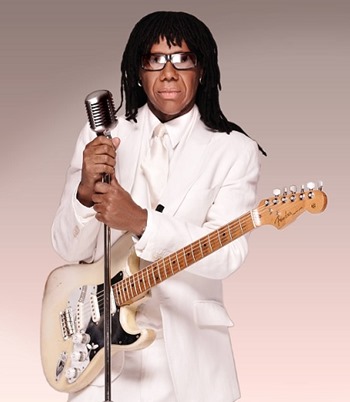
MM : You have produced numerous talented musicians such as MADONNA, DAVID BOWIE, DIANA ROSS, DURAN DURAN, just to name a few. Is there anything in particular that you keep in mind when working with such artists that seem to have a clear vision on how they want their music to sound? How do you maintain to satisfy the artist, and produce a very high level of quality music at the same time?
NR : The more clear the artists are with what they want to do, the easier it is for me to work. When I go to the studio, I never believe that I’m going to leave the studio that night without the essence of a song. I usually believe that I’ll have the song so solid, that at the end of one night it’s a record. AVICII has already told me “You got half of my new album already finished!” We’ve got together and we’ve recorded 6 days, and every one of those 6 days we write what I think is a hit record.
MM : Is there any particular artist whom you produced that you remember the most? Can you share us any episodes that you remember from working with this artist?
NR : I would say DAVID BOWIE was probably the most influential in a strange way other than my own partner, BERNARD EDWARDS. It’s because DAVID BOWIE, similar to the DAFT PUNK situation, didn’t have a record deal. We did everything on ourselves. We didn’t listen to any outside people. It was just us against the world. Same exact scenario as DAFT PUNK. They had no record deal. I was only dealing with them and I never met anyone from the record company, because they had no record company. Same thing with BOWIE. It was just people getting together, going into the studio and making a record. I ask them what they want it to be like, and they explain it to me. Hire the musicians and the studio, then go in and do it. In the case of DAFT PUNK, they had already hired the studio and the musicians, so I was just part of the team, if you will. But a pretty important part!
MM : Your music sounds very dynamic along with having a great groove to it. Your performance as a rhythm guitarist has also fascinated and influenced numerous guitar players. How did you develop and acquire your current style?
NR : It was actually really hard at first. I didn’t use my left hand at all. I only played with my right hand and I played open strings. I would play open strings at very fast tempos like 32nd notes or 16th notes depending on what tempo I had my metronome set at. I would just play open strings and move around from one string to the other and try to make music and try to make it sound good. So now I’m only dealing with 5 notes, 6 if you want to call the E in different octaves. I would be trying to make music out of these 6 notes. So, I went back to my roots…telling myself that the most important element in music is rhythm. How do I make rhythm with these 6 notes and make them sound good as well? I realized no matter how much I tried to control it, it sounded a lot better when I used my right hand to control the sympathetic vibrations. I still wasn’t figuring with my left hand. It was only one hand on the instrument. Once I started to have that sound consistent and nice, then I added my other hand and…oh my God! If I could do that with one hand, listen with what I could do with two. Everybody thinks my sound is pretty simple. But, I’ve played with hundreds of guitar players and whenever they’re playing with me their eyes are fixed on my hands. They know what I play doesn’t sound anything like what they’re playing. We could be playing the same song, but when you play the song it would sound different to what it would sound when I played it.
MM : We find your rhythm guitar performance and chord-work very versatile, having a lot of great musical ideas inside them. Would you be able to share with us how you select the actual sound and notes you play in relation to the song/music that you are working on?
NR : It’s because I come from a jazz background and all of my harmonies are fairly complicated. It’s all old fashioned voice leading. It sounds simple to the ear but is complicated musically. I don’t know how to write simple songs. I make them sound simple. When I was trying to play “Get Lucky” for the first time after 2 years, I couldn’t figure out how to play it. Somebody just screamed out from the back, “What’s the big deal? It’s just 4 chords!” And I laughed and said “Is that what you think I’m just playing 4 chords? Well let me hear you try and play it and sound like I sound.” Because it’s not the 4 chords, but the interpretation of the four chords while I’m playing it. So there’s a whole little pattern going on inside. I’m not just playing chords, but also melodies. I’m also improvising and changing it all the time. So that’s what makes the music sound interesting to me. In the old days we used to call it “one time only events”. But in today’s world, people make these “one time only events” with samples. We used to actually do that with the band.
MM : How do you view the importance of creating your guitar sound?
NR : I’ve been the luckiest person in the world for that. I went one day to a store and bought a Fender Stratocaster not knowing anything about the guitar. I bought a guitar that we have now discovered is probably the only one that exists on this planet. Maybe there’s two. But there’s definitely one and I got it! It was completely luck. I didn’t know a damn thing about Fenders. And I probably only got that one because it was the cheapest one that I could afford. Fender is actually making a copy of it, and they have been working on it for 6 years. It’s that unique. Fenders were simple in concept, but mine was not like that. Because of the organic components that went in to making it, and because of the way that those organic components were shaped and created, and because of all the other things that I added on to it, it became a true one of a kind. It’s the only guitar that sounds like that. I could play with anybody…Clapton, Carlos Santana, John McLaughlin, anybody from the coolest jazz guy to the shredders, as soon as I start playing, you can tell that it’s me!
MM : You have a very percussive way of strumming the guitar. Do you have any advice or tips for this kind of playing style, such as picking and/or stroking methods?
NR : It’s all about control. The more control you have, the better your sound is going to be. I was playing for weeks and weeks without my left hand, only my right hand. Once I got that kind of control, then I incorporated the left hand into it, I could pretty much pick and choose whatever notes I wanted, and get them to respond dynamically in the course of playing the part, which is what gives our music that sort of bounce. Most guitar players would finger all 6 strings. When I play, you only hear 3 strings at a time. Very rarely would your hear me play more than 3 strings at a time. Sometimes you’ll hear 4 and rarely 5. The only time you’ll hear 6 is when I’m playing folk music or something! That is so not-funky sounding to me. For my style of guitar playing, I’ve learned to define the most important harmonic elements with the fewest amount of strings. There are many records where I’m playing double stops. I’m playing 2 strings. People think it’s a whole big gigantic performance and it’s 2 strings. On HALL AND OATES’ “Adult Education” I play 2 strings. Also on “China Girl”. It makes a big statement with 2 strings.
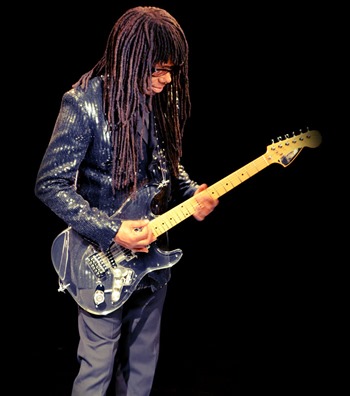
MM : You have a great sense of rhythm and groove, which fascinates the listeners, naturally making them want to dance. What would be your advice on how to develop one’s rhythm? Would you have any specific practice examples?
NR : Practice with one hand first. That’s the way to do it. For me, the discipline of the one had technique changed my whole life. That’s the one discipline that I know most guitar players never did. And listen to the musicians you like. You try to imitate them and sooner or later you’re going to come up with your own sound.
MM : How do you view and feel about the current music scene?
NR : I love it! In every way! The fact that musicians are more independent and making more money than they’ve ever made before. They can make any kind of music they want. They do what ever they want to do. The gear has given opportunities to people that don’t have technical skills, but have intellectual skills. It’s really the old fashioned people that want stuff done the way they do it. They don’t get used to the new stuff because music and the music we love somehow become really important in our teenage and college years. And we don’t seem to expand. Just like mathematicians, they do all their great work in their early 20s. I don’t know when Einstein discovered the theory of relativity, but we see this picture of him with white hair and he discovered the theory of relativity way before that. He just talked about it for the rest of his life. Musicians and mathematicians are very much the same.
MM : Are there any young and upcoming singers and/or songwriters that catch your attention? If there are any, please also tell us why.
NR : A million of them! I’m working with so many of them right now. I wouldn’t want to say anybody in particular because that would make it sound like the other ones are not important. But working with DISCLOSURE is amazing. Working with AVICII is amazing. The songs we write together are so rewarding. Same with CHASE AND STATUS, really great!
MM : You have been involved in We Are Family Foundation project, and we see that you have been putting efforts in trying to create a global family relation through the use of music. Please tell us your perspective on the power of music.
NR : It’s the universal language, the language that we all speak. Music is my business card as well as my white flag, and it allows me to go from the Middle East to Africa, to Iceland, to Tierra del Fuego, to everywhere. I walk in to a room and I go “One, two…Aaahh…”, then the whole audience goes “Freak out!!”. You know that’s going to happen. That’s a wonderful thing, and I sing “We Are Family” and we all get together. Even the most hardened person is affected by something like that. I spent a great deal of time in Ireland this year, talking to a lot of ex-IRA members, and some of these guys were in my arms crying, talking about how much the music meant to them. It’s really incredible, the amount of boy soldiers that I know from Africa, and how much the music has meant to them. It was incredible. When I met President Mandela, and he talked to me about “We Are Family” and told me “These things are important and cultural gifts are things that last way beyond our lifetimes.” I’m pretty sure that after I die, people will think that “We Are Family” was written by their teachers. They won’t know about a guy named Nile Rodgers. But we do know that we sing it! With the Foundation, not only do we help a huge amount of people, but the most important thing that this has been spiritually rewarding. Everywhere we go, we are welcomed with open arms. We build schools, we change kids’ lives. Every kid that has come into our organization never leaves. They love being a part of it. After they graduate they become volunteers because they want to help the next generation. It’s the most wonderful thing that has ever happened in my life.
MM : What do you have coming up next? Tell us about your upcoming schedule.
NR : In the not too distant future, I have maybe 30 to 40 records coming out with different artists, as well as CHIC. I’m writing a Broadway show based on my book “Le Freak”. It’s my life story. I also do all of my charity stuff. I’m working for BONO, will.i.am, as well as my We Are Family Foundation. It’s a life that I don’t have a free day.
MM : Please give the Japanese fans a message.
NR : All I can say is…keep practicing, keep it funky and really love the music because most music doesn’t sell. You have to do it because you love it. And that passion in your heart is what makes you do it.
Nile Rodgers official site : http://www.nilerodgers.com/
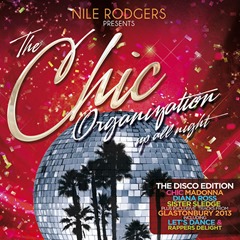
Nile Rodgers Presents The Chic Organization : Up All Night: The Greatest Hits (Disco Edition)
Disk1
1. Le Freak CHIC
2. He’s The Greatest Dancer SISTER SLEDGE
3. Upside Down DIANA ROSS
4. Everybody Dance (12″ Version) CHIC
5. We Are Family SISTER SLEDGE
6. Spacer (12″ Version) SHEILA & B. DEVOTION
7. I Want Your Love CHIC
8. Saturday NORMA JEAN WRIGHT
9. Dance, Dance, Dance (Yowsah, Yowsah, Yowsah) CHIC
10. Lost In Music SISTER SLEDGE
11. My Feet Keep Dancing CHIC
12. My Old Piano DIANA ROSS
13. Chic Cheer CHIC
Disk2
1. Good Times CHIC
2. I’m Coming Out DIANA ROSS
3. Why (12″ Version) CARLY SIMON
4. My Forbidden Lover (12″ Version) CHIC
5. Thinking Of You SISTER SLEDGE
6. I Love My Lady JOHNNY MATHIS
7. Your Love Is Good (12″ Version) SHEILA & B. DEVOTION
8. Like A Virgin (12″ Version) Madonna
9. Frankie Sister Sledge
10. The Reflex (Single Version) Duran Duran
11. The CHIC Minimix THE CHIC ORGANISATION
12. Medley (Live at Glastonbury, 2013) CHIC featuring NILE RODGERS
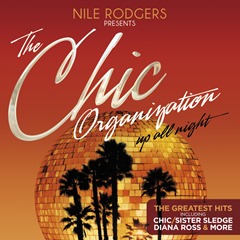
Nile Rodgers Presents The Chic Organization : Up All Night: The Greatest Hits
